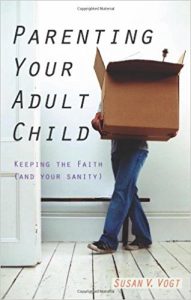Parenting Your Adult Child: Keeping the Faith (and Your Sanity)
 Parents remain parents, even after their children enter adulthood. But that does not imply that the vocation of parenthood will be easy to understand or to negotiate once children move away from home, begin careers, marry or have children of their own.
Parents remain parents, even after their children enter adulthood. But that does not imply that the vocation of parenthood will be easy to understand or to negotiate once children move away from home, begin careers, marry or have children of their own.
There are “bumps along the road of later parenthood,” Susan Vogt writes in “Parenting Your Adult Child.” Vogt is a long-time Catholic family minister. She and her husband Jim are the parents of four adult children.
“The heart of this book is to help you understand how and when to advise, and when to keep your advice to yourself, when to intervene and when to step back, when to talk and when to shut up,” Vogt writes. “Managing this delicate balance is an art,” she believes.
It is an art that can involve some “thorny issues.” Vogt notes, for example, that the parents of adult children may find themselves asking when to rescue and when to allow an adult child to falter, or how to assist a young adult “in life decisions without taking over.”
I am sure Vogt’s reflections on the adult child who, after leaving the nest, “boomerangs” back home again will be welcomed by many 21st century parents, as will her thoughts on adult children who march to “a different drummer.”
Happily, the parents of an adult child may be challenged “to move into an adult relationship with this amazing person [they] have raised,” Vogt points out. She describes a transition parents can make from being responsible for a child to being an adult child’s collaborator. “The collaborating parent must cultivate the art of being supportive while no longer being the one in charge,” Vogt comments.
The author encourages parents, in letting go of their adult children, to “have confidence that God loves each of our children at least as much as we do.” She says there will be times parents need to let go “of being right, even if [they] are right.”
It also is important, Vogt believes, to remember that God is not only loving, but forgiving. She says to parents, “We must follow by forgiving ourselves.” For, “even the best of parents make mistakes.”
The early part of “Parenting Your Adult Child” is devoted to 15 virtues for the parents of adult children. “Cultivating these virtues will help you assist your young adult with making decisions without taking over,” she says.
Her list includes “the virtue of restraint,” along with the virtues of unconditional love and of peacemaking. “The skills and attitudes of peacemaking fundamental to successful marriage need to be transferred to your relationship with your young adult,” the author suggests to parents. Speaking of yet another virtue, that of “giving counsel,” she writes:
“When parenting young adults, wisdom primarily takes the form of discerning when we should intervene and when we shouldn’t.”
Vogt gives considerable attention to the concerns of parents whose adult children either are taking a temporary timeout from the church or appear to have decided no longer to participate in the church at all. “How to keep your faith when your child seems to be abandoning it” is cited by the author as one of the “thorny” issues many parents contend with today.
In a book that “presumes the value of faith,” Vogt strongly recommends that parents themselves “seek a more personal relationship” with the God they want their young adult “to love too.” A survey she conducted elicited numerous comments from parents on communicating with adult children about faith and modeling faith for them.
As a parent of young adults and a grandparent, I found Vogt accurate and insightful on the specific challenges parents may experience at key points in the life of a young adult – at the time of a wedding, for example, or at the time of becoming a grandparent. Of the latter, she writes:
“The natural inclination from having raised kids for more than eighteen years is to give advice. As understandable as this is, I will repeat: The older your offspring, the less advice you should give – unless it’s requested. You may worry and pray as much as you like. The statute of limitations never runs out on worrying or praying.”
Vogt hopes readers will use her book either “as a form of spiritual direction” or for the purposes of a “personalized retreat.” I take it she hopes readers will not read the book as quickly as possible and then lay it aside, but instead, after spending time with it, will revisit its parts from time to time and regard it as a resource.
I find that a worthwhile suggestion, since I am convinced that both the vocations of parenting an adult child and of grandparenting deserve ongoing reflection – reflection not only on what might go wrong in these relationships, but on the many things that might go right.
About the reviewer
David Gibson is the former, now-retired editor of Origins, CNS Documentary Service.
Disclaimer: Book reviews do not imply and are not to be used as official endorsement by the USCCB of the work or those associated with the work. Book reviews are solely intended as a resource regarding publications that might be of interest to For Your Marriage visitors.




